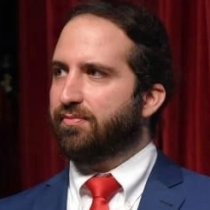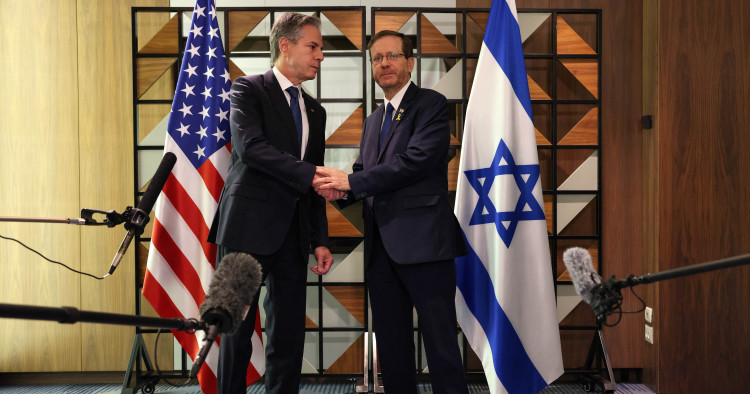Contents:
- Uncertainty abounds in the latest round of Gaza cease-fire talks
- New pressures must be brought to bear if cease-fire talks are to produce any successful outcomes
- While Israelis support a Gaza deal, Netanyahu is not yet on board and a "decisive moment" might be missed
- Lebanon’s unfolding disaster demands a US policy rethink
- Iranian hackers seek to sow chaos in US presidential election
Uncertainty abounds in the latest round of Gaza cease-fire talks
Brian Katulis
Senior Fellow for US Foreign Policy

-
US Secretary of State Antony Blinken makes his ninth trip to the Middle East since the start of the war to try to close an Israel-Hamas cease-fire and hostage release deal.
-
Overall, US policy continues to prioritize helping Israel defend itself against threats and preventing a wider regional war.
US Secretary of State Antony Blinken is currently on his ninth trip to the Middle East since Hamas began this current war by attacking Israel last Oct. 7. Blinken’s main objective is to close the deal on cease-fire and hostage release talks between Israel and Hamas — a diplomatic initiative that President Joe Biden hinged his entire Middle East strategy on since publicly announcing a three-phase diplomatic roadmap at the end of May.
Blinken met with Israeli Prime Minister Benjamin Netanyahu for several hours earlier today, and Israeli sources described the mood as “positive” with a “good atmosphere,” amid mixed signals about last week’s negotiations in Doha and another round of talks slated for Cairo this week. Some Hamas figures have sounded pessimistic notes in recent days about these talks — such sentiments, along with the divisions inside Israel’s government, add to the uncertainty about whether the negotiations will produce the desired diplomatic outcome. The two key challenges for diplomats are 1) the fact that the two main combatants, Hamas and Israel, continue to use force and violence in efforts to eliminate each other, and 2) that both parties continue to add demands aimed at shaping the post-conflict environment.
The Biden administration, with less than five months left in office, lacks a signature, major diplomatic achievement in its overall foreign policy, and its record on handling the Middle East is mixed, as detailed in this analysis published by the Middle East Institute last month.
The top US policy priorities remain helping Israel defend itself against threats and preventing a wider regional war. Last week, the Biden administration approved $20 billion in arms sales to Israel, including fighter jets and air-to-air missiles, though most of these weapons would not arrive in Israel until 2026. Additionally, the Biden administration lifted a ban on the sale of offensive weapons to Saudi Arabia earlier this month. Both moves demonstrate how the Biden administration continues to place a high value on military and security cooperation with Middle East partners.
These defense policy steps also show that years of lobbying by various voices on the left and the right calling for a reduction in arms sales to and security cooperation with America’s Middle East partners have come up empty. The fact that the Democratic Party platform, likely to be approved this week at the party’s convention in Chicago, does not include an arms embargo on Israel, as some advocacy groups have called for, shows how the Biden-Harris administration continues to prioritize support for America’s Middle East partners as they face multiple security threats.
Vice President Kamala Harris, the Democratic presidential candidate, has sounded a slightly different tone on Palestinians, but she remains very much aligned with the Biden administration’s broader policy approach on the Middle East, as this recent tracker on the two main presidential candidates’ Middle East positions demonstrates.
Follow: @Katulis
New pressures must be brought to bear if cease-fire talks are to produce any successful outcomes
Mirette F. Mabrouk
Senior Fellow and Founding Director of the Egypt program

-
There is a new perceived urgency to US diplomatic efforts to reach a cease-fire and hostage release deal, driven primarily by the imminent possibility of a wider regional escalation — a threat that is deeply worrying for Egypt, which is already struggling with armed conflicts on three of its borders.
-
Achieving a different result in these latest negotiations will likely call for new tactics; the question remains what pressure the United States thinks it can bring to bear this time.
US Secretary of State Antony Blinken, currently in Israel on his ninth trip to the region since the beginning of the war, has called the latest diplomatic effort “probably the best, maybe the last opportunity” to bring the raging conflict in Gaza to an end, or at least a pause. He has said sternly that there was no more time to waste and there were no more excuses.
Presumably, he’s addressing Israel and Hamas, although it’s unclear what he thinks might have brought about a change in their respective attitudes; both sides have appeared perfectly happy to ignore the United States to date. Hamas, unwilling to move forward with a future that sidelines it as a ruling organization in Gaza, has demanded a complete Israeli withdrawal from the strip, while Israel has persistently ignored calls to limit civilian casualties and stop impeding humanitarian aid to the desperate and beleaguered population by the international community and by its own leading supporter, the US. The fact that Blinken has made nine trips and continuously come away empty-handed is perhaps the strongest indicator of this intransigence. Indeed, by late Sunday night, Hamas had rejected the new proposal, blaming Israeli Prime Minister Benjamin Netanyahu “for moving the goal posts and the US for indulging him.”
Since the start of the conflict, Egypt and Qatar have been the main mediators, along with the US. The plan currently on the table is an iteration of one that President Joe Biden had offered back in May. While Hamas had provisionally agreed to that one, the group said that new additions by Israel had later made it unacceptable. At the beginning of August, Israeli negotiators had told Axios that they were worried Prime Minister Netanyahu was trying to derail the talks with new conditions. The prime minister’s motives have been under scrutiny since the beginning; the right-wing members of his coalition are bitterly opposed to any deal, and he faces a host of civil charges if he loses his position.
There is, however, a new perceived urgency to the US’s efforts. That’s likely connected to various factors, chief among them the imminent possibility of a regional escalation; Iran and Hezbollah have vowed retaliation after the assassinations of senior Hezbollah commander Fuad Shukr in Beirut and Hamas political leader Ismail Haniyeh in Tehran. Both Iran and Hezbollah have said that a cease-fire would quell the responses. It appears that while the Biden administration is comfortable with little more than ostensibly stern admonishment in the case of 40,000 Palestinian deaths in Gaza, a wider conflict elicits a more robust response.
Egyptian negotiators are pensive, to say the least. Egypt is already struggling with armed conflicts on three of its borders, and an open-ended war in Gaza — with the potential to escalate regionally — is to be avoided at all costs. Achieving a different result in these latest negotiations will likely call for new tactics. The question remains what pressure Washington thinks it can bring to bear this time.
Follow: @mmabrouk
While Israelis support a Gaza deal, Netanyahu is not yet on board and a “decisive moment” might be missed
Nimrod Goren
Senior Fellow for Israeli Affairs

-
Despite the widespread belief that they would scupper negotiations, the assassinations in Beirut and Tehran have not stopped efforts to reach an Israel-Hamas cease-fire and hostage release deal; in fact, talks have even been given a boost.
-
In Israel there is growing support for a deal, but this has not yet impacted Prime Minister Benjamin Netanyahu’s position; the mediators should take additional actions now to ensure the current moment is not lost.
In late July, following the assassinations of a senior Hezbollah commander in Beirut and Hamas’ political leader in Tehran, it seemed as though negotiations for an Israel-Hamas cease-fire and hostage release deal would be stalled for a long time. But the hard work of diplomacy has turned things around, at least for now. While visiting Israel on Aug. 19, US Secretary of State Antony Blinken stated that a “decisive moment,” “probably the best, maybe the last opportunity” for a deal has been reached.
The US was already messaging that we are “closer than ever” to a deal during Israeli Prime Minister Benjamin Netanyahu’s visit to Washington last month. Even before his trip, American officials had indicated that an agreement was just around the corner. But negotiations, which have been taking place since early 2024, have failed time and again.
The current US push for a deal has managed to postpone an imminent retaliation against Israel by the Iran-led Axis of Resistance for last month’s assassinations. This is a meaningful gain, leading the US, Egyptian, and Qatari mediators to emphasize that only sealing the deal will prevent a dangerous regional escalation.
Positive spins following last week’s round of talks in Doha were quickly countered by skeptical statements from both Hamas and Netanyahu. Key obstacles remain in place, the parties continue to play for time, and US pressure on Netanyahu has not yet led to visible progress.
In Israel, the one-year anniversary of Oct. 7 is approaching, and Israelis find it difficult to grasp that the hostages might not be home by then. The general assessment by the security establishment is that their lives are at ever greater risk with each passing day.
Many in Israel hold Netanyahu responsible for that. His lack of political will for a deal has been evident repeatedly throughout the negotiations and is a major stumbling block on the way forward.
Unlike Netanyahu, most Israelis support a deal. According to a recent poll, 63% now favor the current proposed agreement, while only 12% oppose it. Protests pushing for a deal are also taking place regularly.
Security officials, including Minister of Defense Yoav Gallant, have indicated that the military can handle the proposed concessions, which should thus not be deal-breakers. Israeli negotiators, speaking anonymously, have told the media that Netanyahu's actions are blocking progress. And within the political system there is broad support for a deal, despite the far-right’s opposition.
This has not been enough to move Netanyahu though. He does not want to give up Israel’s security presence within the Gaza Strip and opposes an end to the war. This is not only a matter of strategic preference, but also has to do with his domestic political calculations. Since Oct. 7, the prime minister has been on a continuous quest to ensure his political survival, and this has shaped his attitudes toward a possible deal as well.
Talks are still ongoing and public statements should therefore be taken with a grain of salt. They are part of the diplomatic game and things can change. But the combination of increased urgency for a deal and a lack of meaningful progress toward it so far by Israel or Hamas does necessitate some self-reflection by the mediators.
If they are confident that the current formula for a deal is the right one, are they willing to take additional actions vis-à-vis the two sides to get it done? Their current threat to name who is to blame for the failure to reach a deal is not moving the needle. Without a new course of action, the "decisive moment" could very well be missed.
Follow: @GorenNimrod
Lebanon’s unfolding disaster demands a US policy rethink
Fadi Nicholas Nassar
U.S.-Lebanon Fellow

-
Lebanon’s descent into a failed state under Hezbollah’s security dominion can no longer be contained or ignored, and the stakes for the region and for the United States are alarmingly high.
-
The country faces two divergent futures: Lebanon could continue down a path of state collapse, systemic corruption, and militia control; or it could emerge as a credible democracy with a functioning economy and robust state institutions that counter Iran’s failed authoritarian vision for the region.
Following Israel’s assassination of a senior Hezbollah military commander in Beirut and the killing of Hamas political leader Ismail Haniyeh in Iran, Lebanon has become a focal point in a region teetering on the brink of a wider war. In recent weeks, high-level diplomats from Egypt, the United States, and France have visited Beirut to caution against any retaliatory actions that could lead to a critical escalation of the conflict. In conjunction with its diplomatic efforts, the US is also rapidly moving strategic military assets to the Eastern Mediterranean, aiming to more robustly deter Iran and Hezbollah while safeguarding its personnel and interests in the region against the growing risk of a ramping up and spillover of the ongoing hostilities.
In a word, the combination of diplomacy, largely aimed at buying time and creating space for potential de-escalation, on the one hand, and a robust military presence to deter Iran and its proxies on the other serves to once again telegraph President Joe Biden’s earlier warning: “Don’t.”
Yet the need to repeat this warning is a stark reminder that these efforts are stopgap measures to address an unraveling crisis that demands serious, sustained attention. The key lesson here is that Lebanon’s descent into a failed state under Hezbollah’s security dominion can no longer be contained or ignored. The substantial movement of US military assets at a time of great power conflict shatters any illusion that Lebanon is a peripheral concern that can be put on the backburner.
As is often the case with seemingly small states, they don’t matter until they do. And when they do, the stakes are alarmingly high.
Lebanon’s significance extends beyond its geography or its potential to be a spark for or a theater of regional war. The country also represents a critical battleground for competing visions of the future of the region. Lebanon could continue down a path of state collapse, systemic corruption, and militia control; or it could emerge as a credible democracy with a functioning economy and robust state institutions that counter Iran’s failed authoritarian vision for the Middle East. The outcome of this ideological struggle will profoundly shape the region’s trajectory. And whether the US provides meaningful support or remains reactionary will be critical in determining Lebanon’s fate.
Neglecting Lebanon will have dire consequences not only for the country itself but also for the wider region as well as for the US and its interests. We are already witnessing a troubling preview of the potential fallout. Hezbollah’s chief role in the Iran-led Axis of Resistance and Beirut’s transformation into the planning grounds for Tehran and its proxies’ “Unity of the Fronts” strategy foreshadow a future characterized by the erosion of state credibility and borders, widespread migration from failed states, and persistent instability. All of this could be used to exploit US vulnerabilities and strategic weaknesses, potentially manipulating US policy in the Middle East and beyond.
But Lebanon is still not lost. The essential ingredients for success have been there all along: an adversary that can be deterred when faced with a credible threat; a Lebanese public generally averse to participating in regional conflicts and in favor of reforming the country’s failed status quo; and the frameworks of United Nations Resolutions 1559 and 1701, which provide a foundation for securing Lebanon and helping restore the integrity of the country’s state institutions. What remains lacking is the political will and genuine commitment to harness these elements with the strategic focus and urgency that securing Lebanon requires.
Follow: @dr_nickfn
Iranian hackers seek to sow chaos in US presidential election
Mohammed Soliman
Director, Strategic Technologies and Cyber Security Program

-
While the Islamic Revolutionary Guard Corps’ (IRGC) “APT42” cyber hacking outfit has historically focused on espionage, the group has expanded its activities to include launching data-destroying cyberattacks, hacking, and influence operations.
-
In addition to interfering in the US elections by sending phishing emails to the Trump and Biden/Harris presidential campaigns, in recent months, Iranian hackers have launched similar attacks targeting Israeli diplomats, academics, non-governmental organizations, and military affiliates.
Since May, the Islamic Revolutionary Guard Corps’ (IRGC) “APT42” cyber hacking outfit has targeted individuals associated with the presidential campaigns of Donald Trump, Joe Biden, and Kamala Harris, as well as influential think tank members in Washington. The Iranian hackers have specifically focused on current and former government officials, senior staffers, and campaign advisors, along with analysts and staff members at think tanks and non-governmental organizations (NGOs), using email credential phishing. This method involves impersonating trusted senders, such as Google or Microsoft, to deceive recipients into revealing their login information, including email addresses and passwords.
According to Google’s Threat Analysis Group (TAG), “In the past six months, the U.S. and Israel accounted for roughly 60% of APT42’s known geographic targeting, including the likes of former senior Israeli military officials and individuals affiliated with both U.S. presidential campaigns. These activities demonstrate the group’s aggressive, multi-pronged effort to quickly alter its operational focus in support of Iran’s political and military priorities.”
While APT42 has historically focused on espionage, John Hultquist, who leads threat intelligence at the cybersecurity firm Mandiant, notes that the group has expanded its activities. It now exploits access to victim networks for purposes beyond spying, including launching data-destroying cyberattacks, hacking, and influence operations. Some experts believe this may also be the case in the 2024 elections. Attempting to hack the Trump and Biden/Harris campaigns should be seen as part of Tehran’s broader ambition to undermine the American public’s confidence in elections as well as exacerbate political polarization within American society, ultimately aiming to destabilize the United States internally. Tehran had already attempted to interfere in US elections in 2018, 2020, and 2022, employing techniques inspired by Russian influence operations against Moscow’s adversaries — chief among them, Washington. However, Iran focuses, even more than Russia, on creating chaos rather than trying to shape the outcome of the elections. This is mainly because Iran’s cyber capabilities are less sophisticated than the Kremlin’s.
In addition to interfering in the US elections, in recent months, Iranian hackers have launched email phishing campaigns targeting Israeli diplomats, academics, NGOs, and military affiliates. This campaign against Israeli targets involves sending emails that appear to be from journalists, for example, requesting comments on recent airstrikes or from legitimate organizations like the Jewish Agency for Israel or the Washington Institute for Near East Policy. Such attacks are part of the ongoing cyber and military confrontation between Iran and Israel, which has also been exacerbated by the Gaza war.
Follow: @ThisIsSoliman
Photo by KEVIN MOHATT/POOL/AFP via Getty Images
The Middle East Institute (MEI) is an independent, non-partisan, non-for-profit, educational organization. It does not engage in advocacy and its scholars’ opinions are their own. MEI welcomes financial donations, but retains sole editorial control over its work and its publications reflect only the authors’ views. For a listing of MEI donors, please click here.













